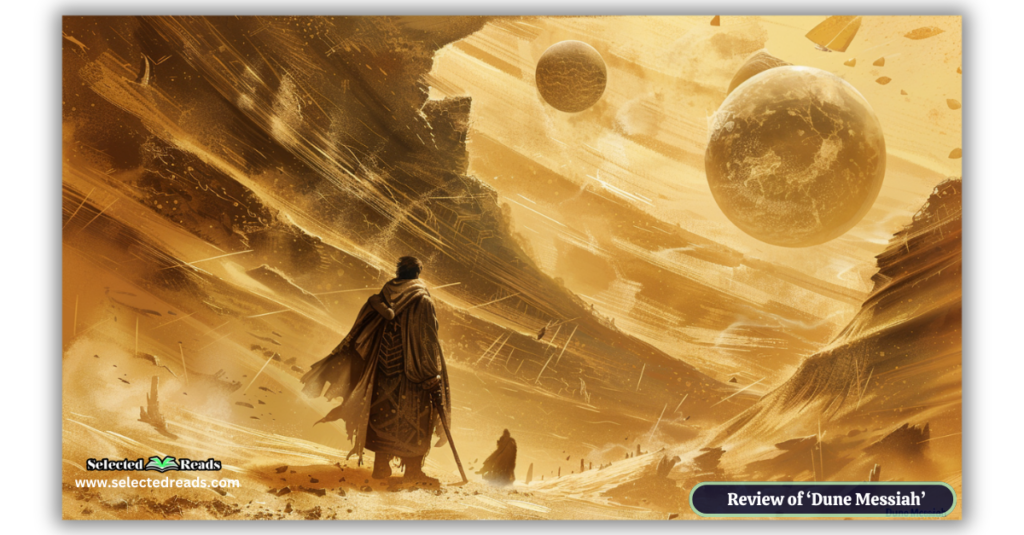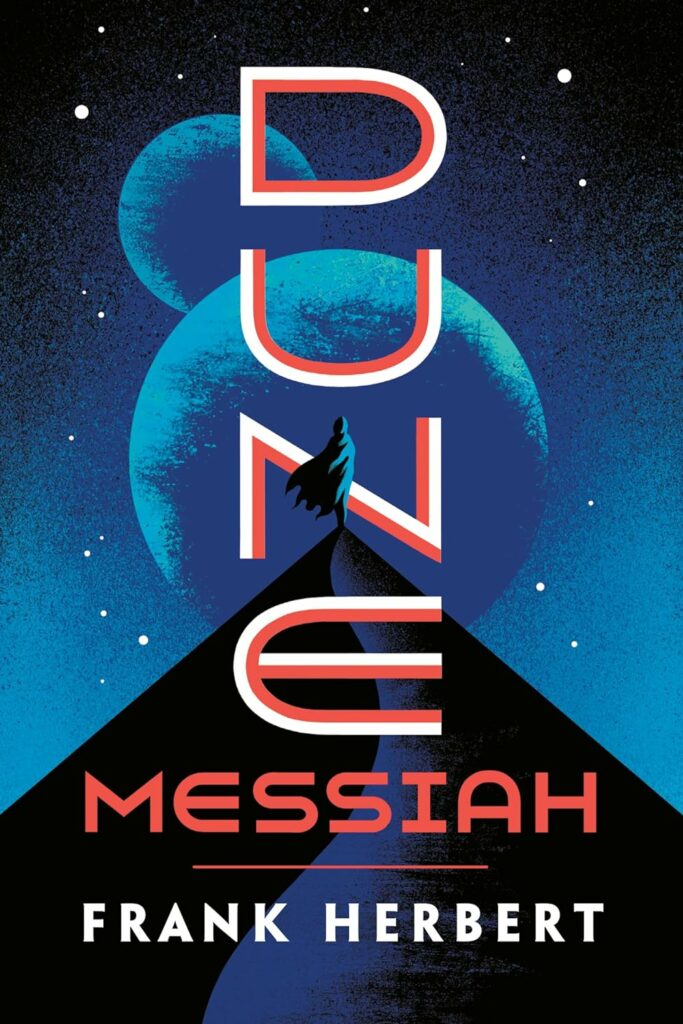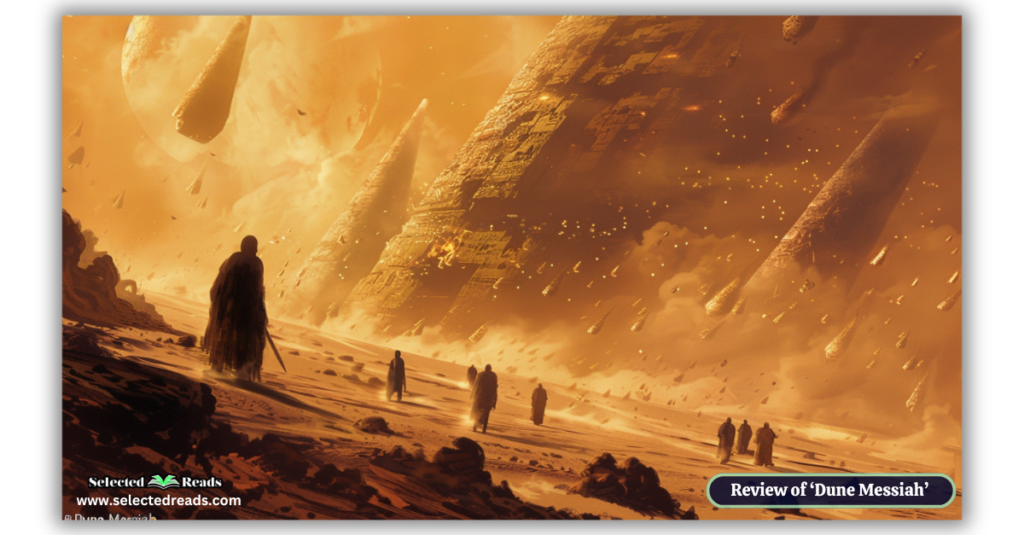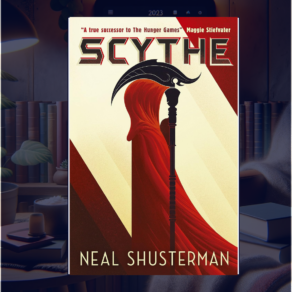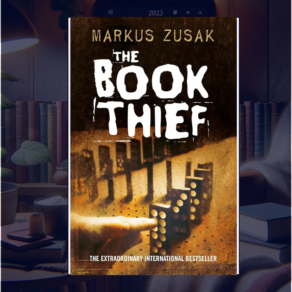Today, we dive into “Dune Messiah” by Frank Herbert, a seminal work in the realm of science fiction. This novel, a cornerstone of the Dune Chronicles, masterfully continues the epic saga of Paul Atreides and his ascent to power in a universe filled with political intrigue and prophetic mystique. The aim of this post is to offer you a comprehensive exploration of “Dune Messiah” without divulging any critical spoilers.
Our journey through this discussion will unfold in three parts: initially, I’ll outline the story to set the stage for newcomers and revisitors alike. Following this, we’ll delve into the intricate tapestry of characters that drive the narrative. To conclude, I will pose a series of stimulating questions designed to enrich any book club’s conversation.
Dune Messiah Summary
“Dune Messiah,” the second book in Frank Herbert’s seminal science fiction series, picks up the narrative of Paul Atreides, now Emperor of the known universe and widely revered as the prophetic figure Muad’Dib. His unprecedented control over both political and religious spheres makes him a target for numerous factions who once held power.
As the novel unfolds, Paul grapples with the burdens of leadership and the far-reaching consequences of his earlier decisions made on the desert planet of Arrakis. Despite his immense prescient abilities, he is haunted by visions of a dark and uncertain future, struggling to avert the potential disasters he foresees.
The story intensifies with the discovery of a conspiracy aimed at undermining Paul’s empire from within. Key figures within his own circle, including revered characters from the first book, are implicated. This plot not only threatens his political standing but also endangers his personal life, specifically targeting his beloved concubine, Chani, and their expected child, the heir to the Atreides legacy.
Photo: Amazon
Throughout the novel, Paul faces assassination attempts and political treachery. His efforts to maintain control and stabilize his reign are complicated by internal dissent and the continuous maneuvering of external powers, including the Spacing Guild, the Bene Gesserit, and the Tleilaxu. Each has their own agenda, aiming to manipulate or overthrow his rule for their gain.
The emotional depth of the novel is enriched by Paul’s internal conflict over his use of prescient powers, which he increasingly views as a curse rather than a gift. His struggle with the moral implications of his decisions, especially those leading to widespread strife and the deaths of millions, is a central theme.
As the novel reaches its climax, the multiple threads of conspiracy and betrayal converge, leading to tragic consequences for Paul and those closest to him. His reign is destabilized, personal losses mount, and the foundations of his empire begin to falter, setting the stage for further turmoil in the subsequent installments of the Dune series.
“Dune Messiah” serves as both a continuation and a deepening of the complex, multi-layered universe Herbert created, exploring themes of power, responsibility, and destiny.
Related: Never Let Me Go Summary and Characters
Dune Messiah Characters
In “Dune Messiah,” Frank Herbert explores the evolving dynamics and complexities of established characters while introducing new, pivotal players who contribute to the unfolding saga. Here are the central characters:
- Paul Atreides (Muad’Dib): Now the Emperor of the known universe, Paul is a central figure, revered as a religious messiah by the Fremen and the ruler of an immense interstellar empire. His prescient abilities provide him with visions of potential futures, which weigh heavily on him as he navigates his dual roles as emperor and prophet.
- Chani: Paul’s beloved Fremen concubine and the mother of his expected heir. Chani’s relationship with Paul is deeply personal and emotional, contrasting with the political machinations surrounding them. Her health and well-being become a central concern as the story progresses.
- Alia Atreides: Paul’s sister, also known as St. Alia of the Knife, she is a powerful figure within the empire. Born with the memories of her ancestors due to the influence of the spice while in the womb, Alia struggles with her own identity and the voices of the past.
- Princess Irulan: Paul’s wife in a political marriage, Irulan is a member of the deposed Corrino dynasty and seeks her own place and power within the Atreides empire. Although she is the official wife, her relationship with Paul is complex and strained due to his love for Chani.
- Duncan Idaho: Previously killed in “Dune” and resurrected as a ghola (a clone with potential memory restoration), Duncan struggles with his identity and loyalty. His character introduces questions about memory, identity, and loyalty.
- Stilgar: A Fremen Naib (chief) and close ally to Paul, Stilgar continues to play a crucial role as one of Paul’s most trusted commanders and advisors. His commitment to Paul and the traditional Fremen ways adds to the cultural and political tensions within the empire.
- Scytale: A Face Dancer and agent of the Bene Tleilax, Scytale is part of the conspiracy against Paul. His abilities to shapeshift allow him to infiltrate the highest levels of Paul’s inner circle, posing a direct threat to the emperor’s security.
- Reverend Mother Gaius Helen Mohiam: A representative of the Bene Gesserit, she is deeply involved in the complex schemes to control and manipulate the genetic destiny of the human race. Her interactions with Paul are charged with mutual distrust and conflicting agendas.
- Hayt: The ghola of Duncan Idaho, resurrected by the Tleilaxu and given to Paul as a gift that doubles as a psychological and strategic challenge.
Dune Messiah Book Club Questions
For a book club discussion on “Dune Messiah” by Frank Herbert, here are some thought-provoking questions that delve into the themes, characters, and narrative complexities of the novel:
- Leadership and Burden: How does Paul Atreides’ role as both a political leader and a religious messiah affect his personal decisions and moral dilemmas? Discuss the burdens and challenges he faces in these roles.
- Prescience and Free Will: How does prescience impact Paul’s choices and his perception of free will? Does knowing potential futures empower him, or does it trap him in a predetermined path?
- Conspiracy and Betrayal: “Dune Messiah” is rife with plots and betrayals. Which conspiracy was most surprising, and why? How do these plots drive the narrative and develop the characters?
- Role of Women: Consider the roles of Chani, Alia, and Irulan in the book. How are they pivotal to the unfolding events? Discuss how their relationships with Paul shape their actions and the story.
- Cultural Clash: The novel showcases a blend of various cultures, especially the Fremen culture juxtaposed with the more traditional political structures of the empire. How do these cultural differences influence the events of the book?
- The Ethics of Power: Discuss the ethical implications of the Atreides’ rule over the universe. Is Paul a benevolent dictator, a reluctant ruler, or something else entirely? How does his rule compare to the traditional houses he displaced?
- Identity and Memory: Explore the theme of identity through the character of Hayt, the Duncan Idaho ghola. What does his struggle with memory and identity say about the nature of self?
- Religious Symbolism: “Dune Messiah” heavily incorporates religious symbolism and themes. How do these elements enhance the story? What parallels can you draw between the religion of Muad’Dib and real-world religions?
- Tragic Elements: In what ways is “Dune Messiah” a tragedy? Consider the fates of the main characters and the inevitability of certain events.
- Reader’s Perspective: Did your perception of Paul change from “Dune” to “Dune Messiah”? If so, how and why?
Related: Parable of The Sower Summary and Characters
Final thoughts
To wrap up, I trust this overview of “Dune Messiah” has piqued your interest and enriched your appreciation for Frank Herbert’s complex universe. “Dune Messiah” is a profound narrative that challenges the bounds of leadership and destiny. If you haven’t yet experienced this iconic continuation of the Dune saga, I strongly encourage you to do so, as it offers not only a riveting story but also a deep reflection on power, identity, and the human condition.



